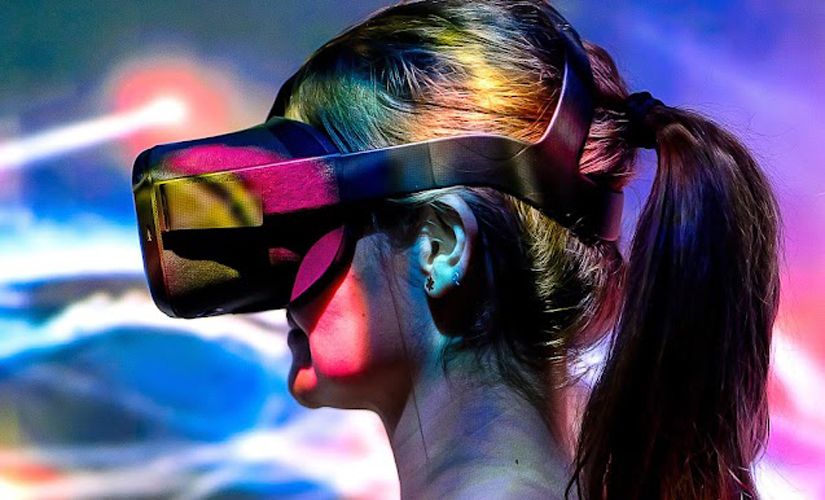Accepted applications from TUL account for approximately 15% of all approved applications. The success in the competition conducted in the framework of Action 2 Cooperation Partnerships in the Higher Education sector is the result of hard work by the project teams of our university.
Sustainable textiles
The GreenTEX (Sustainable Design and Process in Textiles for Higher Education) project is a response to the needs of modern education and the labour market. The intention is to fill the gap in knowledge and activities in the field of Sustainable Textiles.
Modern educational tools use VR technology photo: mat: VR Research Lab
The project will develop innovative solutions and courses of action so that in the future the textile and clothing industry becomes less carcinogenic to the environment and the user can receive a safe, high quality product. The initiators of the project (Dr Monika Malinowska-Olszowy, TUL Prof., and Anna Laska-Leśniewicz, MSc) invited universities from the Czech Republic (Technická Univerzita in Liberec), Portugal (Universidade De Aveiro), Croatia (Sveuciliste in Zagreb) and Lithuania (Kauno Technologijos Universitetas) to cooperate.
Currently, the textile and clothing industry is the second most environmentally damaging industry after the fuel industry. The materials prepared will not only contain concrete solutions, but will also show a whole series of possibilities of sustainable actions, which can be used in the process of education and in business, says Professor Monika Malinowska-Olszowy
GreenTEX will be implemented in 2022 and 2023.
For the well-being of students
The main objective of the VRXanny project (Virtual reality for anxiety and mental stress reduction in university students) is to improve the well-being of students suffering from acute, episodic and chronic stress, anxiety and depressive symptoms. To this end, we envisage creating so-called chill spots where students can relax (for example, before an exam) in a virtual environment. We believe that improving the mental health of our students will increase their chances for normal functioning in university society.
Lodz University of Technology and its partner universities (University of Lodz, Universidad de Vigo and Tartu Ulikool) will be the first universities in the world to implement such a solution. The project will be carried out by the VR Research Lab team from the Institute of Mechatronics and Information Systems (coordinated by Dr Eng. Dorota Kamińska).
Geometry and virtual reality
There is no other element so intertwined with the human perception of reality as space. We learn to observe and understand it from birth, and this process is so natural that it is difficult to even realise. The ability to perceive, analyse and create new objects in space is crucial for mathematical education and beyond.
The Math3geovr (Mathematical models for teaching three-dimensional geometry using virtual reality) project developed by the Centre of Mathematics and Physics and the VR Research Lab team from the Institute of Mechatronics and Information Systems (coordinated by Dr Jacek Stańdo, TUL Prof., Dr Eng. Dorota Kamińska) assumes preparing a set of modern educational tools for teaching three-dimensional geometry using VR technology.
Preliminary pilot research work has shown that their use significantly increases the level of understanding and overall teaching effectiveness, says Dr Jacek Stańdo, TUL Prof.
The project will be developed in cooperation with the Portuguese Universidade de Aveiro, Slovak Univerzita Komenskeho in Bratislava, Estonian Tartu Ulikool and the University of Silesia.
ICT in teaching materials engineering
The COVID-19 pandemic period has revealed Europe-wide problems in the transformation of traditional forms of teaching to digital equivalents. ICT is still not fully used in all fields of education, and is particularly lacking in highly specialised, technological or experimental and project-based subjects.
The DigiMat (Excellence for digital education in materials engineering) project aims to improve teachers' competences to teach subjects/projects digitally, but in a learner-centred way - supporting high student engagement, motivation and creativity.
The project assumes the development of a set of guidelines for teachers and a set of tools supporting online classes of specialist subjects, and, first of all, the preparation of scenarios for online classes in filed of materials engineering, which will be implemented on a specially dedicated digital educational platform, says Dr Eng. Krzysztof Jastrzębski, coordinator of the project.
All the activities undertaken will be carried out in an international consortium in which a team from the Institute of Materials Science and Engineering will collaborate with Tartu Ulikool, Technická Univerzita in Liberec and the Greek University of Thessaly.

